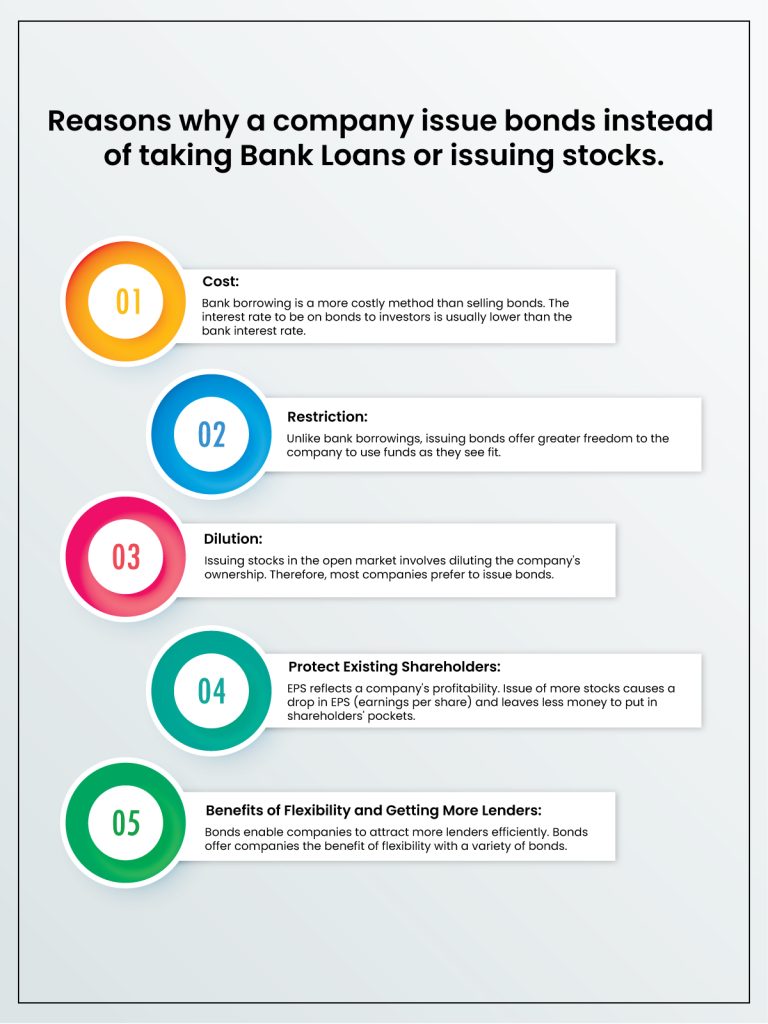Why Do Companies Issues Bonds

What is a Bond and Why Do Companies Issues Bonds
Bonds are debt financing and function as lending funds between an issuer and the investors. Companies can sell bonds to investment institutions or individual investors or place bonds privately. Companies issue bonds to fund various purposes, including building a new plant, equipment purchase, or business expansion. The company agrees to give periodic interest at a coupon till the end of the bond’s term on the amount of money invested by the lender. There is no compound interest on a bond. Bonds are issued with a maturity date for the long term. At the maturity date of the bond, the company needs to repay the investor’s invested capital.
Organisations can borrow funds from banks or issue bonds and stocks to raise capital for their businesses. Many factors drive companies’ priority to issue bonds. Let us have some insight.

-
Cost
Bank borrowing is a more costly method than selling bonds. The interest rate to be on bonds to investors is usually lower than the bank interest rate. Minimising the interest is an important consideration for companies. Bond funding allows companies to borrow large sums at a low cost. They can invest in growth and other projects better than paying more money to banks. Why Do Companies Issues Bonds
Check- Which are the best bonds to invest in India
-
Restriction
Bonds release companies from the restrictions. Unlike bank borrowings, issuing bonds offer greater freedom to the company to use funds as they see fit. For example, banks may levy a condition of not issuing more debt or making corporate acquisitions until the company repays the loan in full. Such conditions can limit a firm’s operational options. They can raise much more money with no such restrictive lines attached with bond issues.
-
Dilution and Why Do Companies Issues Bonds
Issuing stocks in the open market involves diluting the company’s ownership. Therefore, most companies prefer to issue bonds. Issuing shares involve granting proportional ownership of the company to investors. Bonds do not affect the ownership and operations of the company. This is what makes bonds a more attractive proposition.
-
Protect Existing Shareholders
EPS reflects a company’s profitability. It is determined by dividing the profits by the company’s outstanding shares. Issue of more stocks causes a drop in EPS (earnings per share) and leaves less money to put in shareholders’ pockets. eEPS is an important metric for investors to evaluate a company’s financial health. A decreased EPS shows an unfavourable development.
Read also – Is now a good time to buy bonds online
-
Benefits of Flexibility and Getting More Lenders and
Why Do Companies Issues Bonds
Bonds enable companies to attract more lenders efficiently, attracted by the guaranteed returns and repayment on the maturity date. Bonds offer companies the benefit of flexibility with a variety of bonds. Why Do Companies Issues Bonds
Let us have a quick look at bond options and how to buy bonds online.
-
Corporate Bonds:
When a private company issues bonds, these bonds are corporate bonds. These are high coupon bonds.
-
Municipal Bonds:
When states and municipal corporations issue bonds, these are municipal bonds. Generally, these are tax-free bonds.
-
Government Bonds:
The central government issues government securities bonds when the country faces a liquidity crisis and requires funding. You can invest in bonds issued by governments for more safety of capital.
-
Zero-Coupon Bond:
Zero coupon bonds are issued at a discounted rate and redeemed at a premium. Companies do not offer an interest rate on the capital.
-
Convertible Bonds:
Convertible bonds are bonds with equity and debt securities’ features. Companies allow investors to convert bonds into equity shares later during their tenure.
-
And others
For buyers, two types of bond market in India are primary and secondary markets.
- In the primary market, the bond issuer directly sells the bonds to investors as new debt securities.
- The bond bought in the primary market can be traded on stock exchanges or public markets, like the stocks in the secondary market on digital bonds platforms.
Thus, the bond market offers many ways to borrow to companies and investment opportunities for buyers. From various bond options that differ from duration to interest rates, investors should select bonds closely aligned with their financial goals and risk profile. You can find numerous bonds with high credit ratings on reputed platforms.
Check also- Tax Free Bonds, how to purchase bonds in india, invest in government bonds india, Tax free bonds for senior citizens





